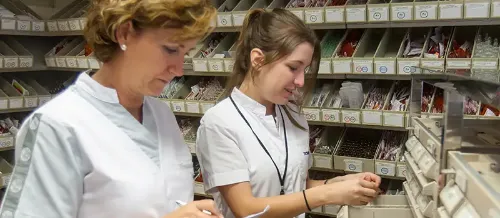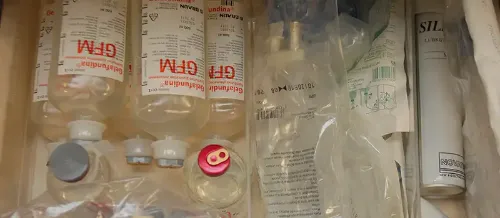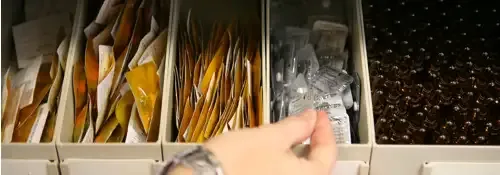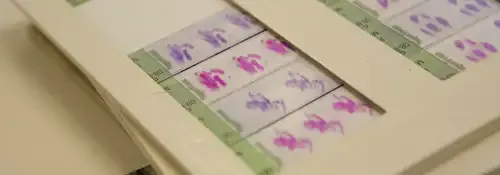Pharmacy
"We have a Pharmaceutical Care Unit that guarantees the continuity of the treatments that have been prescribed to the patient, improving the control of his illness".
DR. ANA ORTEGA DIRECTOR. PHARMACY DEPARTMENT

The Clínica's Pharmacy Service is in charge of managing the medicines acquired by our center and administered to patients, with the aim of ensuring that they have everything they need with maximum safety.
The main mission of the Pharmacy Service is that each patient individually receives the most effective, safest and most cost-effective pharmacological treatment for his or her specific situation. All medication prescriptions are validated by a pharmacist in order to achieve the best results with pharmacotherapy. The pharmacist's job is to ensure that each patient receives the most appropriate treatment, at the right dose, by the right route of administration, at the right time and for the right duration in order to achieve the best results with the use of medications.
Our specialists resolve any questions related to medications and prepare technical reports to support the selection of medications in the Clinic. They are also in charge of the processing of foreign medicines and off-label uses, pharmacoeconomic studies, etc.
In addition, the Pharmacy Service participates in various research projects carried out in our center through the management of drugs in clinical trials and support in monitoring functions.
Our Outpatient Pharmaceutical Care Unit provides patients with information about the medication they are going to receive and is in charge of individualized dispensing. It is mainly aimed at the care of patients with chronic diseases or complex drugs.


Management
Study of the needs of the patients and units of the Clinic.
- Establishment of the necessary procedures to cover these needs through the selection of medicines and medical devices.
- Negotiation for their acquisition.
- Analysis of their use.
Information
Information on medicines, resolution of queries related to medicines, processing of foreign medicines and compassionate uses, pharmacoeconomic studies, etc.
The pharmacist participates in the preparation of reports on drugs that clinicians request to be included in the CUN formulary, evaluating their effectiveness, safety and cost. These reports are presented to the Pharmacy and Therapeutics Committee, made up of different professionals (physicians, pharmacists and nurses), where it is decided by vote whether the drug is to be included in the formulary and under what conditions of use, based on the available evidence.
Dispensing
The Dispensing Area of the Pharmacy Service is in charge of supplying medicines and medical devices to the different units of the Clinic. Its main objective is to ensure that patients have the medicines and medical devices they need to treat their pathologies with maximum safety.

Prescription validation
The pharmacist validates all medication prescriptions made at the Clinic on an individualized basis. The Clinic's information system allows the pharmacist to access all the information in the patient's clinical history and to propose changes in the treatment to the prescribing physician so that the patient receives the best treatment for his/her specific situation: dose adjustment, route of administration, management of interactions, prevention of adverse effects and drug information for physicians and nurses.
Outpatient dispensing
In the outpatient unit, the pharmacist dispenses directly to outpatients some medications for hospital use, special medications or master formulas. During the initial visits, the pharmacist informs the patient of the indications for the drug, the method of administration, possible adverse effects and special precautions to be followed during treatment. In the successive visits in which the patient picks up the medication at the Pharmacy Service, the effectiveness and safety of the treatment is monitored.
Pharmaceutical care for critical and onco-haematological patients
Patients in the critical care area and onco-hematological patients are specially monitored by clinical pharmacists who work as part of the clinical team that attends to these patients. The pharmacist collaborates with other professionals to achieve the best results in these patients who receive complex treatments that require special follow-up. The effectiveness and safety of the treatment, dosage adjustment and other recommendations are monitored so that the patient receives the most effective, safe and cost-effective treatment according to his or her individual characteristics.
Clinical Research
We participate in clinical research through the management of clinical trial medication and support in monitoring functions. The pharmacist is responsible for the reception, proper conservation, custody, validation, preparation and dispensing of clinical trial medication that requires special control. At the Clinic there are currently more than 500 open trials, mainly in the onco-hematology area.
Clinical pharmacokinetics
This consists of optimizing pharmacological treatment in specific patients by determining drug concentrations in blood and using Bayesian adjustment programs. The Pharmacokinetics unit recommends the most appropriate drug dose to achieve maximum treatment effectiveness and reduce the risk of adverse effects. Monitored drugs: antibiotics, cardiotonics, antiepileptics, immunosuppressants, cytostatics, bronchodilators, antidepressants and antipsychotics.
Intravenous Mixtures and Artificial Nutrition Unit
The Pharmacy Service has a centralized unit for intravenous mixtures where drug mixtures (individualized doses of a patient diluted in a serum) are prepared for parenteral administration under safe and sterile conditions. The drugs prepared are mainly anti-infectious and cytostatic drugs. Individualized enteral and parenteral nutrition is also prepared and patients are monitored on a daily basis.
Pharmacotechnical Unit
In the Pharmacotechnics laboratory located in the Centralized Unit of intravenous mixtures, those drugs that patients need and that the pharmaceutical industry does not supply, such as eye drops, oral liquid or solid, parenteral or topical forms, are prepared as master formulas. Some preparations of larger batches are supplied by the Galenic Center of the School of Pharmacy and Nutrition, which is part of the Clinic's Pharmacy Service.
Do you need to request a consultation with one of our specialists?
CLOSER TO THE PATIENT
Pharmaceutical Care Unit
The Pharmaceutical Care Unit of the Clinica Universidad de Navarra offers patients the best information about their medication. It focuses, fundamentally, on the care of patients with chronic illnesses or with complex medications.

Patient Information
We dispense the medication on an individual basis and provide the patient with all the necessary information about the medications he or she will receive.

Patient safety and quality
It guarantees the continuity of the treatments that have been prescribed to the patient, improving the control of his illness.

Why at the Clinic?
- We collaborate in the clinical trials to guarantee the maximum safety of the medicines that are administered.
- Quality controls to offer the best pharmaceutical care.















